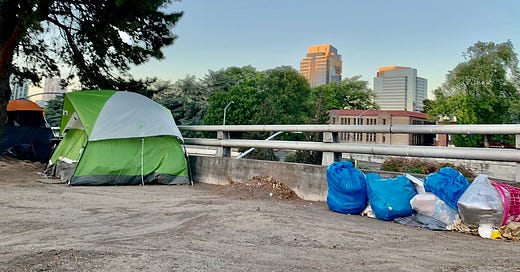Jeff Eager on Homelessness #GovernorGoals
To truly help Oregonians experiencing homelessness, Oregon and its cities must stop tolerating hard drug use, illicit camping and attendant criminality on public property.
EDITOR’S NOTE: This piece is a part of our #GovernorGoals series. Learn more about it here. Send your goals on one of the selected topics to theway@or360.org for potential publication.
To: The Governor
From: Jeff Eager
Date: January 2023
Re: Homelessness policy
Homelessness is a crisis in Oregon. For those Oregonians who live on the streets of our state’s cities, the crisis is most immediate. Many of them endure violence, crime, drugs and, too often, death on the street. And while the brunt of homelessness falls on those enduring it, the crisis also affects Oregonians who live and work near homeless encampments. From downtown Portland to the wildland-urban interface surrounding Bend, homelessness has come to help define what it is to live and, in the case of many of those experiencing homelessness, to die in Oregon.
Worse, Oregon’s homelessness crisis exists because of, and is worsened by, the state’s policies, including those intended to help those who live on the streets of our state. Oregonians’ impulse to help those in need, a commendable trait, has been misapplied to the homelessness crisis. We do not help people when we allow, and in some cases facilitate, the destruction of their lives on public property. It is well past time to get Oregon taxpayers out of the business of subsidizing the humanitarian crisis that is homelessness.
What is needed, first, is a reassessment of what it means to be homeless today. Author Michael Shellenberger, who formerly worked on progressive policies around homelessness and drugs, calls homeless encampments “open-air drug markets” because their defining characteristic is the transaction and use of hard drugs like methamphetamine, heroin and fentanyl. In his book, San Fransicko, Shellenberger argues that San Francisco and other progressive cities beset by homelessness need to crack down on open-air drug markets and beef up mandatory treatment and temporary shelter options.
Other analysts have also tied drug use to the homelessness crisis. Journalist Sam Quinones, author of the book The Least of Us: True Tales of America in the Time of Fentanyl and Meth, ascribes the growing prevalence of homeless tent-camping on public property to the development and availability of a new, far more dangerous, form of methamphetamine:
According to my reporting ... it's happening across the country. You see these symptoms showing up in Albuquerque, in rural Indiana and West Virginia. In places, in fact, where they never had homelessness before. And now they have homelessness. They have people wandering the streets completely unbalanced. You have the tent encampments popping up. Tents are perfect lodgings for people who are suffering from this kind of meth-induced paranoia and hallucination because the entire world seems a threat and now out to get you. Certainly, you can't live in an apartment or a house, and you really cannot live in a homeless shelter, because it's very scary there. The tent is like this pod of isolation.
Admitting the connection between homelessness and drug use is not a partisan position. Shellenberger and Quinones are not conservative anti-homeless crusaders or NIMBYs; they are progressives who approach the homelessness problem from the perspective of those who experience homelessness. And, acknowledging the drug use crisis is mandatory to address Portland and Oregon’s homeless crisis. The authors’ assessment of the homeless crisis as a symptom of the drug crisis applies to Oregon as well.
Multnomah County recently released its analysis of the 126 people experiencing homelessness who died in the county in 2020. The results demonstrate the scourge of hard drugs.
One of the leading causes of deaths among homeless people were alcohol and drug use, specifically opioids and methamphetamine. According to the report, drug use was noted in nearly 90% of people who died while experiencing homelessness, and drug or alcohol toxicity contributed to more than half of all deaths. Of the 71 deaths ruled accidental, 75% were related to drugs or alcohol. There were 37 deaths determined to be from natural causes; 32% of those involved complications from drug or alcohol abuse.
Ninety percent of the people experiencing homelessness who died in Multnomah County in 2020 were officially noted for using drugs. The homeless crisis in Oregon is indeed, in large measure, a drug crisis. To acknowledge this fact does not mean that every person experiencing homelessness uses drugs, nor does it mean that those who do use drugs do not need help; they do. But the help they need is different than that which Oregon is trying to give them.
The prevalence of hard drug use among Oregon’s homeless population, and the tendency of today’s hard drugs, especially methamphetamine, to encourage tent camping, means that the drugs, and not the housing, are the first order problem. Oregon and its cities can continue to spend hundreds of millions of dollars to create housing alternatives, but if those alternatives are drug-free, the vast majority of the homeless population is unlikely to avail themselves of them. If those alternatives allow drug use, they simply shift addiction-fueled self-destruction from streets and parks to other publicly-funded facilities.
To truly help Oregonians experiencing homelessness, Oregon and its cities must stop tolerating hard drug use, illicit camping and attendant criminality on public property. Zero tolerance does not always mean incarceration; it can mean mandatory treatment. But it must start with the commitment from you that Oregon will no longer provide the setting for human and community degradation.
Jeff is a writer of politics and lame jokes at Oregon Roundup on Substack. Jeff worked in Washington, D.C. for Oregon Congressman Greg Walden, served as Mayor of the City of Bend, and has been practicing law in Oregon for over a decade.
Related pieces:
photo credit: "Portland homeless, COVID19, BLM. August 2020" by drburtoni is licensed under CC BY-NC-ND 2.0





